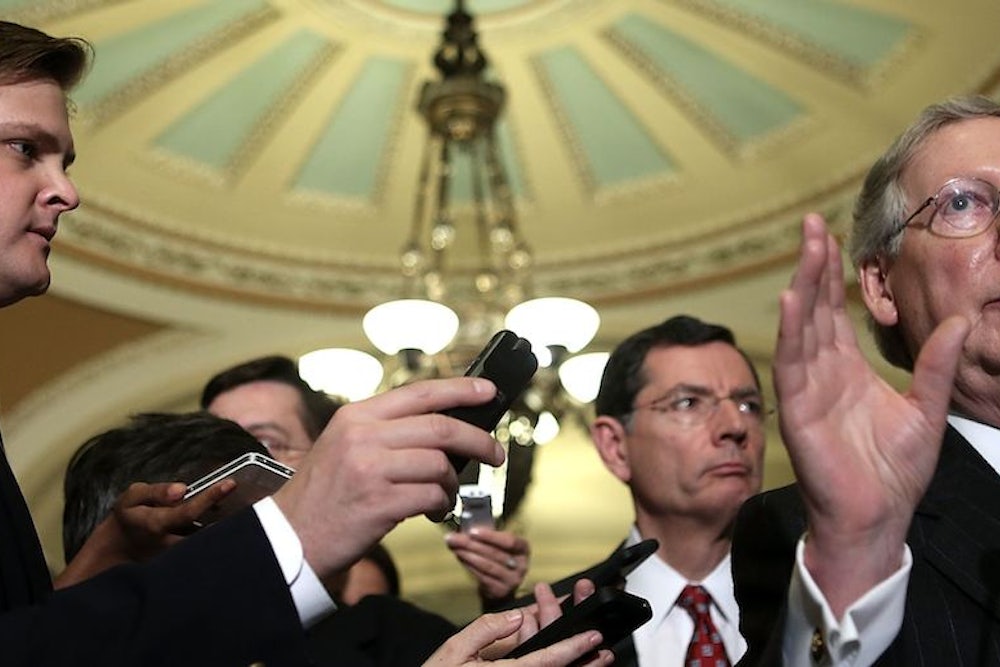On Tuesday, Mother Jones reporter David Corn released audio of Senator Mitch McConnell and his reelection campaign staff yukking it up over the various zany quotes and writings of Ashley Judd, who was considering a run against McConnell at the time. Unlike Corn’s last recording—the bombshell video, taped at a private fundraiser, of presidential candidate Mitt Romney calling 47 percent of the country "dependent upon government"—this one was made at a strategy session where, if the transcript is any indication, there were only few people besides McConnell. McConnell’s campaign manager has said that the senator was the victim of “Nixonian tactics to bug campaign headquarters.” But most believe that he was recorded by someone present at the meeting.
Which prompts the question: Do leaked recordings like these have politicians—and the people working for them—spooked?
“I guess we should start assuming that you may be recorded wherever,” said Rep. Eric Swalwell, a freshman congressman.
In some ways, this is a case of recent technology giving legs to an old Washington quandary: whether you can trust the person sitting across from you. But Jason Meath, a Republican consultant, says there are new developments in campaigning to worry about. For instance, the intensity of modern political races has caused some consultancy firms to employ hundreds of people who dissolve relationships as soon as they develop them, their length dictated by the electoral calendar.
“Who is in this revolving door of people? You may not know.... You just have to be very careful,” he said. “It’s why leaders have summits in Iceland, for god’s sake.”
But what, former Clinton adviser Paul Begala wondered, would today's press call a politician who did such a thing—who collected cell phones at the beginnings of meetings, deployed software to detect when a call was being recorded, or specifically sought out bug-free spaces? “I think you would write that that congressman is being paranoid," he told me.
Several consultants agreed that the McConnell leak—its execution, not content—is much more surprising than the "47 percent" video. "If you take a dump on half the country at a crowded dinner, it's gonna come out," said Begala. "But when you're in a strategy meeting with your closest advisers? I don’t happen to think much of McConnell. But what’s next? The Supreme Court chambers? When a justice talks to one of her clerks?”
“The ability to be frank and open in a private setting with trusted aides, about the reality of the modern political world we all live in, is important,” emailed a Republican strategist, who did not wish to be named.
The only real safeguard, some say, is trust.
“The advice I tell my clients isn’t going to change: Don’t have conservations with consultants you can’t trust,” Rick Tyler, a Republican strategist, said.
Meath agreed. “Technology should make everybody pause for a second and ask if they really know whether their comments really are being held in confidence,” he said. “But at the end of the day, you have to be able to trust the person sitting across the table from you.”
And that's something that politicians and their staff have relied on—and been burned by—since long before the invention of smartphones and discreet digital recorders.
When he worked in the White House, Begala said, “I can remember being nervous when I looked across the table and someone was taking notes. I’d think, OK, how soon until those notes are in the Washington Post or subpoenaed by Ken Starr? And you clammed up.… You had to learn to be more discreet. ‘Oh, if I want to tell the president something, I’d better wait 'til we’re actually alone.’”
Fred Davis, a Republican political consultant, knows a little something about leaks. He was the subject of controversy last year after the storyboards for a racially tinged, anti-Obama ad campaign he designed was leaked to the New York Times. “We all still talk as though no one can hear,” Davis wrote in an email. “Until it happens to us.” But relatively few have been victims of it: “Leaking hasn’t yet reached critical mass.”
That may change. Today, the Washington Post reported that Corn has received “a mini-flood of would-be audio and video leaks about Washington figures.” He is in the process of vetting the promising ones.
(Update: A Democratic Kentucky official has said that the leaders of Progress Kentucky, an anti-McConnell super PAC, told him that they were responsible for the recording—that they taped the conversation from the hallway outside the room where the meeting was taking place.)
